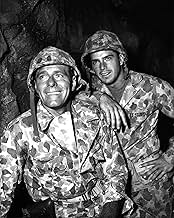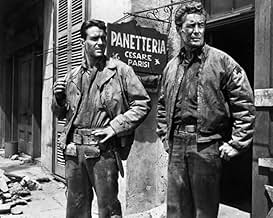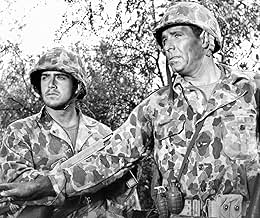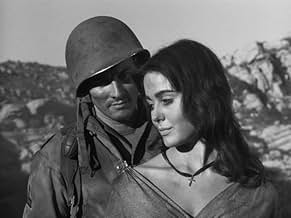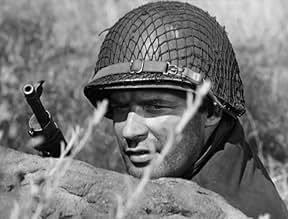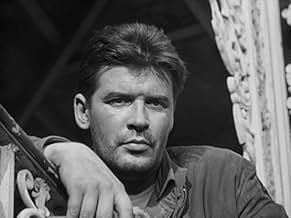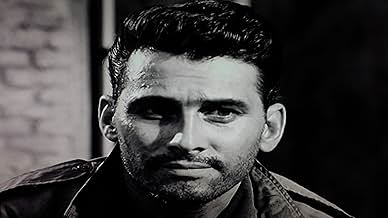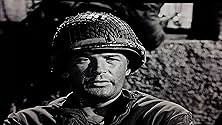La trentaseiesima fanteria si sta facendo strada attraverso l'Italia sotto la guida vivace del capitano Jim Benedict.La trentaseiesima fanteria si sta facendo strada attraverso l'Italia sotto la guida vivace del capitano Jim Benedict.La trentaseiesima fanteria si sta facendo strada attraverso l'Italia sotto la guida vivace del capitano Jim Benedict.
Sfoglia gli episodi
Recensioni in evidenza
I haven't seen this show since it originally aired on ABC in 1962. I was 11 years old and it seemed like everybody's dad was a WWII vet. We played "army" using original equipment, including Lugers and Nambus! I remember this show as being fairly vivid. It must have made an impression on me because I still watch war flicks, some 40 years later. My question is: where can this series be viewed or purchased? Help, anyone?
Unlike some of the other reviewers, I (at 13) felt that "The Gallant Men" was a better show than "Combat!" (at least at that time), probably because it was a little more cerebral.
In my 8th grade English class (during the 1962-1963 season) I had the good fortune to have Roger Davis (Gibson) speak to us. (His kid brother was in our class.) He explained at the time that "The Gallant Men" was produced by Warner, while "Combat!" was produced by a production company owned by ABC, so likely "The Gallant Men" was fated to be cut at the end of the season. His prediction was accurate.
(He also explained how the producers kept salary demands in line -- any actor causing trouble could be written out as quickly as a gun can fire.)
In my 8th grade English class (during the 1962-1963 season) I had the good fortune to have Roger Davis (Gibson) speak to us. (His kid brother was in our class.) He explained at the time that "The Gallant Men" was produced by Warner, while "Combat!" was produced by a production company owned by ABC, so likely "The Gallant Men" was fated to be cut at the end of the season. His prediction was accurate.
(He also explained how the producers kept salary demands in line -- any actor causing trouble could be written out as quickly as a gun can fire.)
It seems with all the forces going against this series, it wasn't surprising it only lasted 26 episodes. The networks really struggled against each other for high rated shows at prime time 7pm to 10pm for me. Altman was much more needed then only directing the pilot. ABC had a better eye on Combat having a better production team, big name guest host every episode, & a cast that worked exceptionally well. William Reynolds admitted he didn't have the drive to become a better actor. Vic Morrow on the other hand took the show over Rick Jason even though both agreed to split top credit. Warner Brothers wouldn't take on guest hosting like Combat did. The competition for prime time slots was furious with shows like Jackie Gleason..... The Gallant Men could of lasted longer had there been more money to doe out. The cast was good & Reynolds also. He left acting early, just lacked personal desire to become a career actor even though he had what it took to be one with his looks on his side. Gallant Men was a good show fighting the war in Italy. The war affected every country in Europe, not just France. Combat covered that country. There was many battles in Italy, where one of my uncles fought. I read a review regarding Robert Conrad being casted into the Gallant Men, yea that would be one of a few more things they could of kept TGM on TV longer. Combat focused on a squad & TGM should of done the same but added two more regular characters. Again this is a money matter. Italy had a lot of mountain battles where writing some episodes tied together in two parts would of really made some great episodes, a string of them. Story telling in a series is a must to have good writers. I believe with a bigger number of cast members where the likes of a Robert Conrad would of fit in snuggly & fighting in Sicily also another major battle ground gave TGM more lasting. There was a lot of actors to hire for the show. Richard Boone, Ty Harding, Peter Brown, Peter Breck, comes to mind. I do not think that two TV WW II series running different days of the week would of tired audiences. Both being in different countries. Look at the decade of the 1950s of Westerns on every channel & network 7 days a week. .
Just a quick correction to one of the other comments....The Gallant Men took place in Italy, not in the Pacific. Combat was set in France.
I was nine when this show aired...and the son of a WWII vet....and loved the show. Not as much as Combat....but well enough. During those few years...8 to 11 or so....I would join my pals of the same age group on weekends....and all thru the summer....and "play army"in the woods across the street....with stuff we got at the War Surplus store....or got from our dads'.....and back then..toy stores sold the most amazingly realistic toy weapons...I had a very detailed plastic replica of the Thompson submachine gun...as well as a replica of the old Springfield rifle. We were inspired by both Combat and The Gallant Men to play the most realistically detailed "war games"....as only innocent 10 year-olds can...today was Normandy...next week...the French hedge rows....in winter..The Battle of The Bulge...in the heat of summer... Guadalcanal ...we had a blast.
That was 1962-3-4......
In a few short years...by 1968...war was no longer a game for us....but but a real event on TV every day...that we had to begin to reckon with.
As sobering as that turn of history was....I will never forget the the thrill of our games....perhaps because we aspired to be like our dads'...til life changed for all of us.
I was nine when this show aired...and the son of a WWII vet....and loved the show. Not as much as Combat....but well enough. During those few years...8 to 11 or so....I would join my pals of the same age group on weekends....and all thru the summer....and "play army"in the woods across the street....with stuff we got at the War Surplus store....or got from our dads'.....and back then..toy stores sold the most amazingly realistic toy weapons...I had a very detailed plastic replica of the Thompson submachine gun...as well as a replica of the old Springfield rifle. We were inspired by both Combat and The Gallant Men to play the most realistically detailed "war games"....as only innocent 10 year-olds can...today was Normandy...next week...the French hedge rows....in winter..The Battle of The Bulge...in the heat of summer... Guadalcanal ...we had a blast.
That was 1962-3-4......
In a few short years...by 1968...war was no longer a game for us....but but a real event on TV every day...that we had to begin to reckon with.
As sobering as that turn of history was....I will never forget the the thrill of our games....perhaps because we aspired to be like our dads'...til life changed for all of us.
The pilot of "Combat" was not as well made as the pilot of "The Gallant Men".
Robert Altman directed the pilot of "The Gallant Men". He was key in casting all the regulars. Boris Sagal ("Rich Man, Poor Man") directed the pilot for "Combat", but never did another episode. The producers of "Combat" hated the look of their pilot and loved the look of the "Gallant Men" pilot. The producers convinced Altman to move over to "Combat" as a producer-writer-director. Altman did some of his best work on the first season of "Combat", and he got the series off to a superb start. Altman says on a "Combat" DVD commentary of an episode with Albert Salmi that he never got better than that as a director. Altman also said that "Combat" had a better cast than "The Gallant Men", even though he cast "The Gallant Men" and had nothing to do with casting "Combat".
"The Gallant Men" was probably suggested by "The Story of G.I. Joe" (1945) where Burgess Meredith played war correspondent Ernie Pyle and Robert Mitchum played an infantry captain. In "The Gallant Men", Robert McQueeney was top billed as war correspondent Conley Wright.
"The Gallant Men" focused on a company while "Combat" focused on a single squad. The squad level turned out to be the ideal vehicle to tell war stories and to allow the viewer to get close to the characters. "Combat" also benefited from having one of the 1960's best series performances: Vic Morrow as Sergeant Saunders. Morrow was nominated for an Emmy for the first season of "Combat", but lost to E.G. Marshall ("The Defenders"). "Combat" also hired superb guest stars that Warner Brothers would never pay up for: Jeffrey Hunter, Lee Marvin, James Coburn, Rip Torn, John Cassavetes and many others. And finally, "Combat" paid for better writers and wound up with much better scripts.
Warner Brothers was a very cheap outfit, although they often did manage to make compelling shows.
Robert Conrad gave an excellent guest star performance on "The Gallant Men" as a sergeant who was the brother of series hero Captain Benedict (well played by William Reynolds.) Robert Conrad might have been brilliant as a tough squad leader, maybe even as good as Vic Morrow. Conrad should have been brought in as the new series star. The show should have focused on Conrad's squad rather than the company. The most appealing regular on "The Gallant Men" was 23-year old Roger Davis as Private Gibson. Conrad could bring Gibson along from episode to episode until finally Gibson is given a battlefield commission and becomes Conrad's platoon leader. This could have led to a strongly written and played relationship that could have given the show a dramatic center-something it badly needed.
Robert Altman's original conception for "The Gallant Men" was to kill off the regulars from week to week. This was a fascinating idea that could have made the series very realistic and emotionally involving. If Robert Altman had stayed on board, "The Gallant Men" might have given "Combat" a run for its money.
Robert Altman directed the pilot of "The Gallant Men". He was key in casting all the regulars. Boris Sagal ("Rich Man, Poor Man") directed the pilot for "Combat", but never did another episode. The producers of "Combat" hated the look of their pilot and loved the look of the "Gallant Men" pilot. The producers convinced Altman to move over to "Combat" as a producer-writer-director. Altman did some of his best work on the first season of "Combat", and he got the series off to a superb start. Altman says on a "Combat" DVD commentary of an episode with Albert Salmi that he never got better than that as a director. Altman also said that "Combat" had a better cast than "The Gallant Men", even though he cast "The Gallant Men" and had nothing to do with casting "Combat".
"The Gallant Men" was probably suggested by "The Story of G.I. Joe" (1945) where Burgess Meredith played war correspondent Ernie Pyle and Robert Mitchum played an infantry captain. In "The Gallant Men", Robert McQueeney was top billed as war correspondent Conley Wright.
"The Gallant Men" focused on a company while "Combat" focused on a single squad. The squad level turned out to be the ideal vehicle to tell war stories and to allow the viewer to get close to the characters. "Combat" also benefited from having one of the 1960's best series performances: Vic Morrow as Sergeant Saunders. Morrow was nominated for an Emmy for the first season of "Combat", but lost to E.G. Marshall ("The Defenders"). "Combat" also hired superb guest stars that Warner Brothers would never pay up for: Jeffrey Hunter, Lee Marvin, James Coburn, Rip Torn, John Cassavetes and many others. And finally, "Combat" paid for better writers and wound up with much better scripts.
Warner Brothers was a very cheap outfit, although they often did manage to make compelling shows.
Robert Conrad gave an excellent guest star performance on "The Gallant Men" as a sergeant who was the brother of series hero Captain Benedict (well played by William Reynolds.) Robert Conrad might have been brilliant as a tough squad leader, maybe even as good as Vic Morrow. Conrad should have been brought in as the new series star. The show should have focused on Conrad's squad rather than the company. The most appealing regular on "The Gallant Men" was 23-year old Roger Davis as Private Gibson. Conrad could bring Gibson along from episode to episode until finally Gibson is given a battlefield commission and becomes Conrad's platoon leader. This could have led to a strongly written and played relationship that could have given the show a dramatic center-something it badly needed.
Robert Altman's original conception for "The Gallant Men" was to kill off the regulars from week to week. This was a fascinating idea that could have made the series very realistic and emotionally involving. If Robert Altman had stayed on board, "The Gallant Men" might have given "Combat" a run for its money.
Lo sapevi?
- ConnessioniReferenced in Svengoolie: The Land Unknown (2014)
I più visti
Accedi per valutare e creare un elenco di titoli salvati per ottenere consigli personalizzati
- How many seasons does The Gallant Men have?Powered by Alexa
Dettagli
- Data di uscita
- Paese di origine
- Lingua
- Celebre anche come
- ギャラント・メン
- Luoghi delle riprese
- Azienda produttrice
- Vedi altri crediti dell’azienda su IMDbPro
- Tempo di esecuzione1 ora
- Colore
- Proporzioni
- 1.33 : 1
Contribuisci a questa pagina
Suggerisci una modifica o aggiungi i contenuti mancanti

Divario superiore
By what name was The Gallant Men (1962) officially released in Canada in English?
Rispondi
